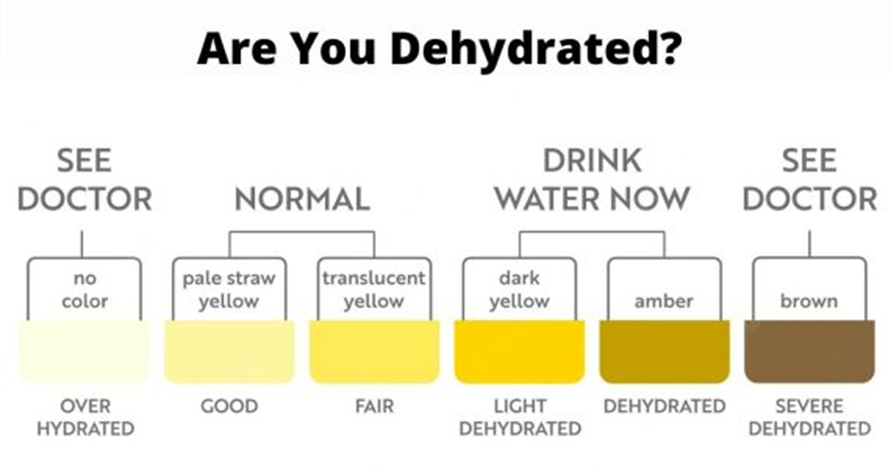The nurse notices that an older adult’s urine is concentrated. Which step should the nurse implement next?
Evaluate the medication list
Review laboratory reports
Increase oral fluid intake
Determine fluid volume status
The Correct Answer is D
Choice A reason: Evaluating the medication list is a possible step that the nurse can take, as some medications can affect urine concentration or cause dehydration. However, it is not the first step that the nurse should implement, as it does not address the immediate problem of fluid balance.
Choice B reason: Reviewing laboratory reports is another possible step that the nurse can take, as some laboratory tests can indicate the level of hydration or kidney function of the patient. However, it is not the first step that the nurse should implement, as it does not provide a direct assessment of fluid status.
Choice C reason: Increasing oral fluid intake is a potential intervention that the nurse can suggest, as it can help to dilute the urine and prevent dehydration. However, it is not the first step that the nurse should implement, as it may not be appropriate for some patients who have fluid restrictions or other medical conditions.
Choice D reason: Determining fluid volume status is the first step that the nurse should implement, as it can help to identify the cause and severity of urine concentration and guide further actions. The nurse can assess the patient's fluid intake and output, weight, blood pressure, pulse, skin turgor, mucous membranes, and urine specific gravity to determine fluid volume status.

Nursing Test Bank
Naxlex Comprehensive Predictor Exams
Related Questions
Correct Answer is ["A","B","D","E"]
Explanation
Choice A: Pressure ulcers - Physical restraints can lead to immobility, which increases the risk of pressure ulcers due to prolonged pressure on the skin.
Choice B: Death - Restraints can cause fatal accidents. For example, a person might try to remove the restraint, fall, and suffer a fatal injury.
Choice C: Sepsis - While sepsis is a severe condition often caused by an infection, it's not a direct result of physical restraints. However, if a pressure ulcer (caused by restraints) becomes severely infected, it could potentially lead to sepsis.
Choice D: Decreased circulation/perfusion to the extremities - Restraints can restrict movement, leading to decreased blood flow to the extremities.
Choice E: Fractures - Struggling against restraints can lead to falls and subsequent fractures.
Correct Answer is D
Explanation
Choice A reason: This is incorrect because using smooth muscle relaxants is not the most important aspect of care for the nurse to maintain when assisting an older client with urinary incontinence. Smooth muscle relaxants are medications that can relax the bladder and reduce the urge to urinate, but they can also cause side effects such as dry mouth, constipation, or blurred vision. They are not suitable for all types of urinary incontinence, and they should be used with caution and under medical supervision.
Choice B reason: This is incorrect because availability of protective rubber garments is not the most important aspect of care for the nurse to maintain when assisting an older client with urinary incontinence. Protective rubber garments are devices that can prevent urine leakage and protect the skin and clothing, but they can also cause skin irritation, infection, or odor. They are not a cure for urinary incontinence, and they should be used as a last resort or in combination with other interventions.
Choice C reason: This is incorrect because using indwelling urinary catheters is not the most important aspect of care for the nurse to maintain when assisting an older client with urinary incontinence. Indwelling urinary catheters are tubes that can drain urine from the bladder and collect it in a bag, but they can also cause complications such as urinary tract infections, bladder spasms, or trauma. They are not recommended for long-term use, and they should be used only when other methods have failed or are contraindicated.
Choice D reason: This is correct because maintaining an attitude that is respectful and positive about resolving the problem is the most important aspect of care for the nurse to maintain when assisting an older client with urinary incontinence. Urinary incontinence can cause embarrassment, shame, isolation, or depression in older clients, and they may be reluctant to seek help or comply with treatment. The nurse should respect the client's dignity, privacy, and preferences, and provide education, support, and encouragement. The nurse should also assess the underlying causes and contributing factors of urinary incontinence, and implement individualized and evidence-based interventions.
Whether you are a student looking to ace your exams or a practicing nurse seeking to enhance your expertise , our nursing education contents will empower you with the confidence and competence to make a difference in the lives of patients and become a respected leader in the healthcare field.
Visit Naxlex, invest in your future and unlock endless possibilities with our unparalleled nursing education contents today
Report Wrong Answer on the Current Question
Do you disagree with the answer? If yes, what is your expected answer? Explain.
Kindly be descriptive with the issue you are facing.
